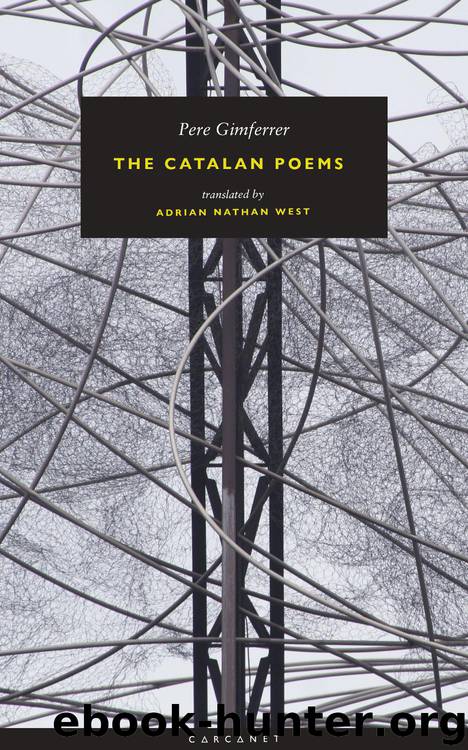The Catalan Poems by Gimferrer Pere; West Adrian Nathan;

Author:Gimferrer, Pere; West, Adrian Nathan; [Pere Gimferrer]
Language: eng
Format: epub
ISBN: 5744813
Publisher: Carcanet
Published: 2019-03-12T16:00:00+00:00
19 October 1979
A Sorcerer’s Disappearance
One uncertain day, sometime in the mid-twenties, a young Ernest Hemingway is sitting on the terrace of the café La Closerie des Lilas in Paris. A shriveled man in a cape walks past in the company of a tall girl, glances furtively at the guests, doesn’t stop to stare, vanishes. A friend of Hemingway’s, present at the time, tells the author: ‘That’s Aleister Crowley, the diabolist. He’s supposed to be the wickedest man in the world.’
Several years later, the same man, with the same cape and the same girl – a German by the name of Hanni L. Jaeger – reaches port in Lisbon. The month is September, the year 1930. Imposing, the man in the cape – with ‘malicious, satanic eyes’, we are told – greets an acquaintance who is standing there waiting for him: a timid character, faint of heart, an aficionado of the occult, whom he only knows from correspondence. There was fog, and the ship has reached Lisbon twenty-four hours late. Crowley, sardonic, playing his role to the hilt, greets his Portuguese friend with the words: ‘What possessed you to send this fog my way?’
It is an ambiguous reproach, part wry, part conciliatory, bearing an allusion to their shared interest in necromancy. This tone will define the two men’s relationship. The Englishman is a complex figure: spy and agent provocateur for the English government during the First World War; magician, astrologer, theosopher, millenarian, a freemason even, apparently. He has traveled in India and China; in Bombay, it is said, he killed a native to drink his blood, but this may be an unfounded rumor; he is known by the titles Master Therion and The Beast 666, the same one identified in the Book of Revelations. He speaks Greek and Latin. The Portuguese, dark and secretive, is named Fernando Pessoa; many years after his death, the world will know him as a great poet.
The episode ended rather absurdly, with the sorcerer vanishing in seemingly enigmatic circumstances, leaving behind a message in theosophical code. Pessoa drew on the occasion for a series of extraordinary hypotheses that attracted the attention of members of the press. Naturally, it was all smoke and mirrors (the matter is too convoluted to summarise here), and a year later, Pessoa will write to a friend: ‘Crowley, who went to live in Germany after his suicide, wrote me the other day…’ Still, the supposed disappearance of the sorcerer, and the alternate panic and humor he provoked in Pessoa, are representative of one of every poet’s hidden desires: the thing Nerval called ‘the expansion of dreams into life’. To achieve it by appealing to the complicity of a sorcerer of a more or less farcical character – or, to be precise, farcical on occasions, but not always, and not in all things, evidently – is a path less sincere than poetic invention and less hazardous than alcohol or hallucinogens. And yet it has a double advantage: it is a path that impends
Download
This site does not store any files on its server. We only index and link to content provided by other sites. Please contact the content providers to delete copyright contents if any and email us, we'll remove relevant links or contents immediately.
| Ancient, Classical & Medieval | Anthologies |
| British & Irish | Japanese & Haiku |
| Love Poems | Regional & Cultural |
| Themes & Styles | United States |
| Women Authors |
The Universe of Us by Lang Leav(14828)
The Sun and Her Flowers by Rupi Kaur(14321)
Adultolescence by Gabbie Hanna(8585)
Whiskey Words & a Shovel II by r.h. Sin(7805)
Love Her Wild by Atticus(7588)
Smoke & Mirrors by Michael Faudet(5935)
Wiseguy by Nicholas Pileggi(5316)
The Princess Saves Herself in This One by Amanda Lovelace(4821)
Love & Misadventure by Lang Leav(4691)
Milk and Honey by Rupi Kaur(4587)
Memories by Lang Leav(4570)
Bluets by Maggie Nelson(4261)
Good morning to Goodnight by Eleni Kaur(4101)
Too Much and Not the Mood by Durga Chew-Bose(4091)
Pillow Thoughts by Courtney Peppernell(4011)
Algedonic by r.h. Sin(3879)
The Poetry of Pablo Neruda by Pablo Neruda(3815)
HER II by Pierre Alex Jeanty(3475)
Stuff I've Been Feeling Lately by Alicia Cook(3311)
